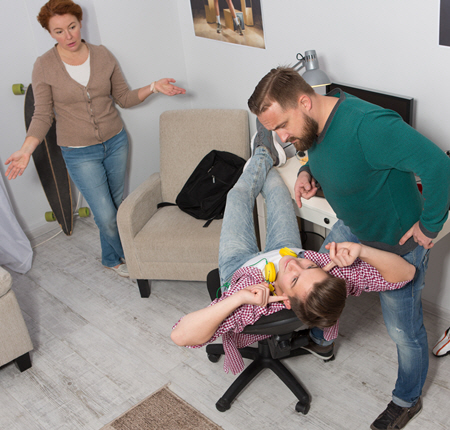 Parents, don’t pull your hair out…
Parents, don’t pull your hair out…
… and especially don’t pull your teenager’s hair out 😊.
Your little person isn’t a little person anymore, but they’re not adults either. They’re living in a strange space, and this strange space calls for changes in the way you relate to this different person occupying space under your roof.
He may become aloof, angry, sullen, or simply not the kid you’ve always known – that’s OK – this is a rough spot, but we can get through it.
What’s up with the adolescent brain?
Well, for one… it’s unfinished!
In Play Therapy for Tweens and Teens, Dr. Jennifer Lefebre points out, “The rapidly changing brain is responsible for the adolescent communications gaps and growth.” She goes on:
- Adolescence is when language ability and short-term memory improve.
- The teen brain reacts emotionally instead of logically.
- Teens experience emotions before they can verbally articulate them.
- Teenage self-awareness and teenage self-consciousness go hand-in-hand.
- Teens are more vulnerable to stress than adults are.
These facts alone don’t make communication with your teen/tween any easier, but they do provide insight about why you may “miss each other” occasionally, even frequently.
 Countering resistance, opposition, and shut down…
Countering resistance, opposition, and shut down…
Teens/tweens may begin to resist their parents because they don’t want to feel like they’re babies anymore.
They might oppose parents just to see what kind of reaction they’ll get (or they might truly disagree with parents’ perspective), or they may shut down altogether.
Silence is probably the worst of all. Using art, music, playing games, and talking about anything but the alleged problem is the best way to begin a comfortable therapeutic relationship with a child in this season of life.
It’s important to give tweens and teens the freedom to approach sessions with topics that are of interest to them. So, I let them teach or share with me (possibly a shortcut with technology) things about the music they enjoy…
 Moving forward and addressing the issues…
Moving forward and addressing the issues…
To keep the focus on what might be hindering or bothering your tween or teen, I’ll employ a number of different formats and techniques, including game play, sand tray therapy, art therapy, or play therapy.
As kids this age get involved in activities with which they are comfortable, they become more comfortable sharing what’s on their minds and in their hearts. It’s kind of a back door approach for getting to the heart of the matter.
Contact me now… while that young brain is still under construction. There’s work to be done! (903) 472-6461

